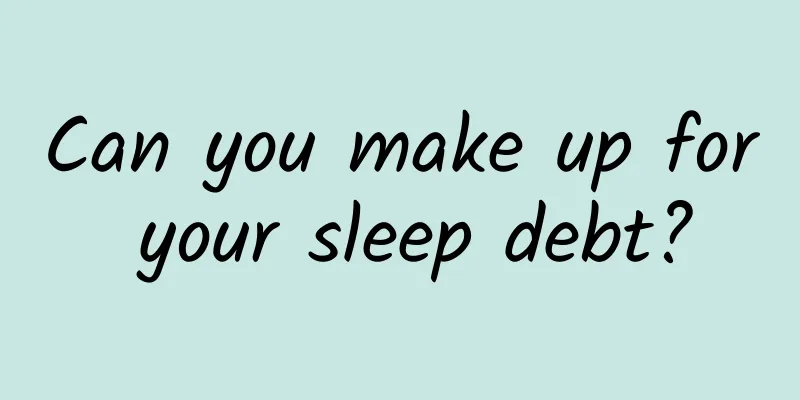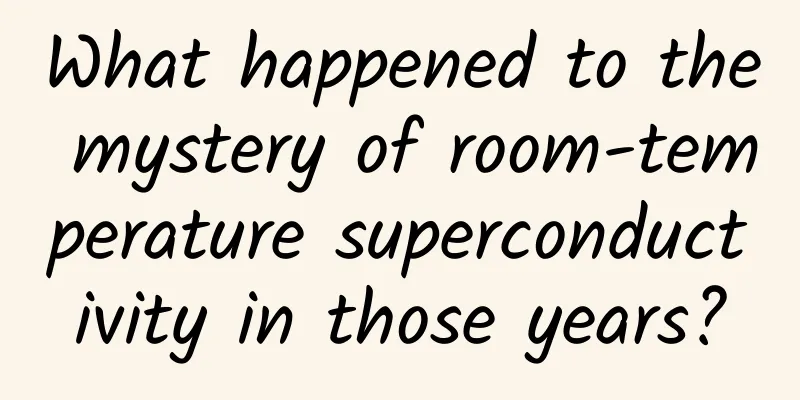Can you make up for your sleep debt?

|
For many people, sleeping in on the weekend is one of the greatest pleasures. Before sleeping in, we will turn off the alarm clock so that we can sleep a little longer to relieve the fatigue of the week. But why do we still feel tired after sleeping in? Catching up on sleep on the weekend sounds useful, but it's not the case, because we can't "catch up" as much sleep as we think. Basically, we need one hour of sleep for every two hours we're awake, but the time we spend in bed is not the same as the time we sleep, and many people can't "fall asleep as soon as they lie down." 1. If you don’t get enough sleep for a long time, you will have a sleep debt If we don't get enough sleep, we develop a sleep debt. Sleep debt is the difference between how much sleep we need and how much sleep we actually get. Every time we miss a certain amount of sleep at night, that time is added to our sleep debt. The more sleep we miss, the more sleep debt we accumulate, and the more impaired our brain function becomes. If we sleep two hours less every night during the work week, it means that we will owe a total of ten hours of sleep debt. In this way, even if we sleep well on Saturday and Sunday, it cannot offset all the sleep debt, which will make us fall into sleep debt. We cannot pay off all our sleep debt by sleeping in on the weekends, because each sleep we take can only add a little more effective time to the normal sleep duration. The normal sleep duration refers to the sleep duration that follows the circadian rhythm. Sleeping in on the weekends does not follow the circadian rhythm, so it cannot achieve the desired effect of sleep and is not enough to offset all sleep debt. Circadian rhythm refers to the endogenous periodic changes of organisms' life activities that are independent of external day and night time cues, such as the rhythm of behaviors such as eating, body activity, sleep and wakefulness. The English name of circadian rhythm is "circadian rhythm", where the word "circadian" comes from the Latin words "circa" and "dies", the former meaning "approximately" and the latter meaning "day". At the same time, circadian rhythm is also called "C process", which is the "master clock" of the body to ensure that all systems function normally and work in coordination with each other. The "master clock" is controlled by the suprachiasmatic nucleus in the brain. The suprachiasmatic nucleus is a nucleus in the anterior hypothalamus that contains several types of neurons. Sunlight "resets" the suprachiasmatic nucleus every day: our eyes track changes in light and send signals to the suprachiasmatic nucleus to align our internal clock with the external environment, and activate various body functions based on these signals. The C process is essential to the functioning of the human body. It controls important activities of the human body, such as temperature regulation, digestion, hormone secretion, etc. Various changes in the external environment we receive (such as the amount of light) will affect the C process. Living in harmony with the C process is the key to staying healthy, and good sleep is one of the important factors for the normal operation of the C process. In addition, catching up on sleep can give us headaches and even make us feel worse than if we didn't catch up on sleep. This is because the longer we stay in bed, the more water we lose. Therefore, the best way to "catch up on sleep" is to avoid or minimize sleep debt. Image source: pexels 2. How to avoid sleep debt? Start by adjusting your bedtime Don't stay up late, go to bed when you feel sleepy. This will not only allow us to have more sleep time but also allow us to wake up naturally when it is time to get up. Keep a sleep diary By keeping a diary for a few weeks, we can calculate how much sleep we get and figure out how our sleep debt is built up. A sleep diary can also help us discover what makes it difficult for us to go to bed early. Keeping a sleep diary is not only about recording sleep-related matters, but also about what we do during the day when we are not sleeping. Doing so can help us understand our sleep and how our sleep affects other things in our lives. When using cognitive behavioral therapy (CBT-I) for insomnia to improve insomnia, keeping a sleep diary is an important part, which can help make judgments when formulating improvement plans. The timing of naps is important Naps can help offset some of our sleep debt, but don’t nap too close to bedtime. The ideal nap requires a complete sleep cycle, which is about 90 minutes, but it is difficult for us to do this in real life. Therefore, the most feasible way is to sleep for 30 minutes or less and wake yourself up before deep sleep begins. If we nap for more than 30 minutes, we are likely to be awakened from a deep sleep, which will make us feel groggy and take a long time to wake up. Studies have found that napping for more than 60 minutes increases the risk of type 2 diabetes by about 50%. Therefore, people who are at higher risk of type 2 diabetes should avoid taking long naps regularly. In addition, when using cognitive behavioral therapy (CBT-I) for insomnia to improve insomnia, naps are futile for insomniacs who need to limit daytime sleep, because daytime naps will reduce the probability of falling asleep normally at night, thereby interfering with the effect of improving sleep. In short, sleep debt cannot be made up, but we can pay attention to sleep from now on to avoid owing more sleep debt. What is lost cannot be obtained, but the future is in our own hands. |
<<: Transform a 6 cm cockroach into a cyborg, what can it do? Exploration and rescue
Recommend
Why is QQ, which was abandoned by the post-90s generation, so popular among the post-00s generation?
1. As a person born in the 90s or 80s, what is th...
Qiuqiu Comics e-commerce: Comics Gravity Cube, Qiuqiu Comics Express, Qiuqiu Comics Super Recommendation Value 1197 yuan
Qiuqiu Comics e-commerce: Comics Gravitational Cu...
Answers to the WeChat ban on Xiaohongshu’s popular articles, lucky draws, and traffic diversion
Xiaohongshu has become popular due to its grass-p...
Creating the "3D Panoramic Tour" Secret in H5
[[165029]] VR virtual reality technology has been...
Let’s put it in simple terms, the metaverse is coming towards us whether we like it or not. So is it a wolf or a sheep?
"Suddenly, as if overnight, a spring breeze ...
2020 Shanghai University Emblem Blind Box Admission Notice
Shanghai University Emblem Blind Box Admission No...
Tesla's sports car may not end up as happy as expected after entering space
According to foreign media reports, the Falcon He...
Core formula for live broadcasting
Today I’m going to talk to you about the design o...
Case Study: Analysis of Jiliwawa’s Distribution System
Jiliwulala is an online children's enlightenm...
After the 80 million patent case, Huawei chose to fight back against Samsung's exclusion
Recently, a well-known big data organization rele...
When an earthquake strikes, what kind of house is safer?
At 23:59 on December 18, a magnitude 6.2 earthqua...
OPPO Smart TV K9 65-inch review: One billion colors, a powerful player that cannot be ignored
If we say that last year OPPO was still testing t...
I never thought that there is "third-hand smoke" after second-hand smoke? !
"Smoking is harmful to health" has beco...
When planning creative information flow advertising, you must pay attention to these four details!
When placing homogeneous advertisements in inform...









